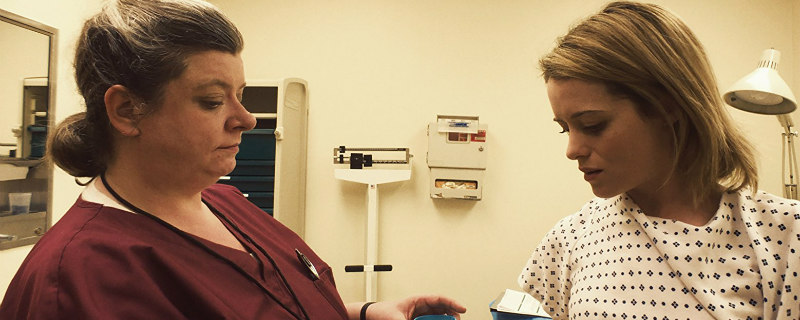
Review by Eric Hillis
Directed by: Steven Soderbergh
Starring: Claire Foy, Joshua Leonard, Jay Pharoah, Juno Temple, Amy Irving

"Your phone is your worst enemy!" So advises a cameoing Matt Damon's cop to Claire Foy's stalking victim in Steven Soderbergh's Unsane. The line plays like an in-joke on Soderbergh's part, as the film itself was shot using iPhones, not for budgetary reasons, but because the director/cinematographer, who has experimented with developing technology throughout his career, shot his thriller in relative secrecy on a tight schedule, the ease of the device allowing him to quickly transition between camera set-ups and save hours of production downtime.
From a script by Jonathan Bernstein and James Greer, Unsane is headlined by rising star Foy as Sawyer Valentini, a young office worker whose cold exterior masks anxiety issues caused by a prolonged stalking incident in her past. Attending what she thinks is a simple therapy session, Sawyer finds herself involuntarily checked in to a psychiatric institution after signing some seemingly innocuous forms without reading the small print.

The ensuing drama sees Sawyer trapped in a bureaucratic Kafkaesque nightmare, her initial 24 hour confinement extended to seven days after she defends herself against a male inmate and punches a staff member. The middle class Sawyer is forced to interact with/take advantage of people she would likely normally cross the street to avoid, including a black man, Nate (Jay Pharoah), who has somehow managed to sneak a cellphone into the institute, and an unstable young redneck girl (a genuinely intimidating Juno Temple).
Seemingly influenced by Sam Fuller's 1963 psychodrama Shock Corridor, Soderbergh uses Unsane's setup to explore the perils of a system that treats healthcare not as a public service but as a commercial enterprise. As Nate explains to Sawyer, it's in the interest of the institute to keep her in their care until her insurance cover runs out and she no longer provides a source of income for the facility.

This is a fascinating premise in itself, and midway through Unsane I was beginning to think it might be the director's best work since his 1989 debut, Sex, Lies and Videotape. Foy is a magnetic presence, and even though the film paints Sawyer as complicated at best, unlikeable at worst, we're always fully behind her quest to attain freedom. The use of natural light allowed by the iPhone gives the film a suitably clinical and sickly aesthetic, and the format's distinctive aspect ratio is narrow enough to evoke claustrophobic confinement, wide enough to tease a world beyond the frame.
Things begin to go awry when the film morphs from a politically motivated exposé of corruption to a run of the mill but poorly plotted psychological thriller as Sawyer's former stalker (Joshua Leonard, best known as one of the doomed protagonists of The Blair Witch Project, a movie whose innovative use of technology no doubt left an impression on Soderbergh) turns up as a member of staff at the facility.

It all gets a little silly from this point, with the film raising the awkward question of how Sawyer's stalker could have possibly known she would end up an inmate at that particular institute. Further plotholes emerge on what had been a smooth thoroughfare of a storyline as the movie struggles to mine tension from a subplot that serves merely as a distraction from a broader societal question. Had Soderbergh remained focussed on his film's initial theme, Unsane might have created a wider Get Out style conversation around the ethics of commercialising the care industry. As it is, most viewers will leave Soderbergh's film asking questions about minor unexplained plot points.

Unsane is in UK/ROI cinemas March 23rd.

